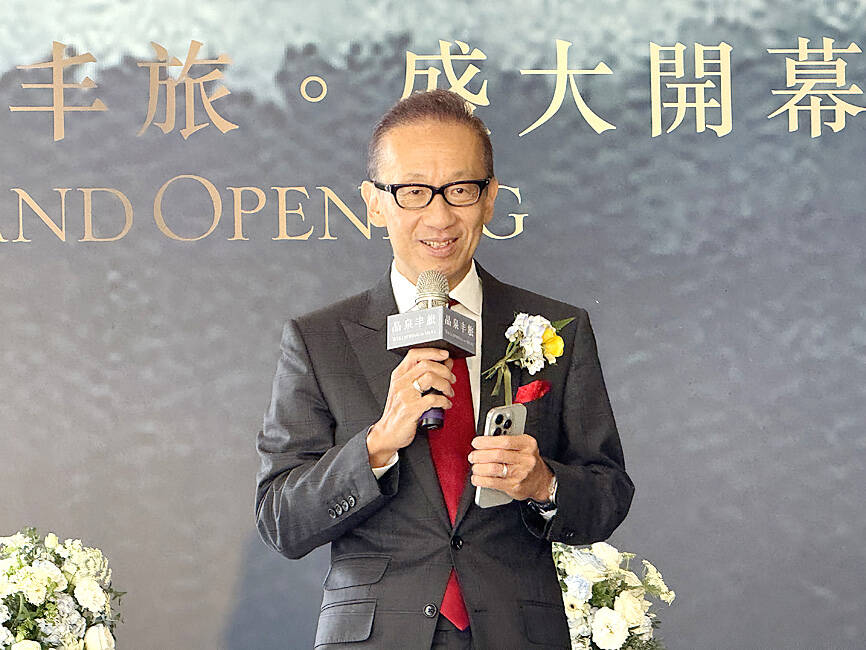Taiwan’s hotels are taking an indirect hit from US tariff challenges, but hopefully the negative impact would prove short-lived, as the US and its trade partners iron out their differences, Formosa International Hotels Corp chairman Steven Pan (潘思亮) said yesterday.
Pan, whose company operates hotels under the brands Regent Taipei (台北晶華酒店), Silks Place (晶英酒店), Just Sleep (捷絲旅) and Wellspring by Silks (晶泉丰旅), made the comments at the grand opening of Wellspring by Silks Beitou (北投晶泉丰旅).
“Tourism, while driven by domestic demand, is closely tied to the broader economy,” Pan said. “If the economy flounders, the hospitality industry cannot remain unaffected.”

Photo: CNA
Concerns about a potential economic downturn are mounting, as global markets reel from escalating tariff tensions linked to US changes in trade policies, he said.
The global economic landscape looks murky and fluid at present, but with US financial markets showing signs of stabilization, the worst could soon be over, he said.
Pan called the coming three months “critical” after US President Donald Trump announced a 90-day moratorium on “reciprocal” tariffs.
Failure by the US and its trade partners to achieve clarity during this period could push the global economy into a slump, with far-reaching effects on industries focused on manufacturing, as well as tourism and services, he said.
While manufacturers would bear the brunt of tariffs, service-oriented industries would also suffer due to frail consumer confidence, Pan said.
The global economy has long been underpinned by US consumer demand, but the burden might shift to other countries, in light of Trump’s drastic policy changes, he said.
China, where Pan has business interests through the Regent brand, is most vulnerable to tariff-related shocks, as the US has more than doubled its tariff burden, he said.
The impact on China would be very, very significant, he added.
By contrast, Taiwan could turn the ongoing turbulence into an opportunity by repositioning itself within global supply chains, he said.
“Taiwan now plays a role in tech similar to what Hong Kong once was in finance,” he said, suggesting that the country could benefit from closer alignment with US technology moguls.
If Taiwan could navigate the uncertainty with prowess, it might emerge more integrated and influential in the global economy, Pan said.
Still, Pan has a positive outlook for Taiwan’s tourism sector, aided by the country’s rich tourism resources and steady travel demand.
Wellspring by Silks Beitou (北投晶泉丰旅), for instance, reported an average occupancy rate of 75 percent after its soft opening, higher than an estimated 60 percent, he said.
However, Pan voiced grave concern over a persistent labor shortage in the hospitality industry, describing the issue as a “national security-level” crisis.
He urged the government to develop effective workforce policies to support the sector’s sustainable growth.

STEEP DECLINE: Yesterday’s drop was the third-steepest in its history, the steepest being Monday’s drop in the wake of the tariff announcement on Wednesday last week Taiwanese stocks continued their heavy sell-off yesterday, as concerns over US tariffs and unwinding of leveraged bets weighed on the market. The benchmark TAIEX plunged 1,068.19 points, or 5.79 percent, to 17,391.76, notching the biggest drop among Asian peers as it hit a 15-month low. The decline came even after the government on late Tuesday authorized the NT$500 billion (US$15.2 billion) National Stabilization Fund (國安基金) to step in to buoy the market amid investors’ worries over tariffs imposed by US President Donald Trump. Yesterday’s decline was the third-steepest in its history, trailing only the declines of 2,065.87 points on Monday and

TAKING STOCK: A Taiwanese cookware firm in Vietnam urged customers to assess inventory or place orders early so shipments can reach the US while tariffs are paused Taiwanese businesses in Vietnam are exploring alternatives after the White House imposed a 46 percent import duty on Vietnamese goods, following US President Donald Trump’s announcement of “reciprocal” tariffs on the US’ trading partners. Lo Shih-liang (羅世良), chairman of Brico Industry Co (裕茂工業), a Taiwanese company that manufactures cast iron cookware and stove components in Vietnam, said that more than 40 percent of his business was tied to the US market, describing the constant US policy shifts as an emotional roller coaster. “I work during the day and stay up all night watching the news. I’ve been following US news until 3am

Six years ago, LVMH’s billionaire CEO Bernard Arnault and US President Donald Trump cut the blue ribbon on a factory in rural Texas that would make designer handbags for Louis Vuitton, one of the world’s best-known luxury brands. However, since the high-profile opening, the factory has faced a host of problems limiting production, 11 former Louis Vuitton employees said. The site has consistently ranked among the worst-performing for Louis Vuitton globally, “significantly” underperforming other facilities, said three former Louis Vuitton workers and a senior industry source, who cited internal rankings shared with staff. The plant’s problems — which have not

TARIFF CONCERNS: The chipmaker cited global uncertainty from US tariffs and a weakening economic outlook, but said its Singapore expansion remains on track Vanguard International Semiconductor Corp (世界先進), a foundry service provider specializing in producing power management and display driver chips, yesterday withdrew its full-year revenue projection of moderate growth for this year, as escalating US tariff tensions raised uncertainty and concern about a potential economic recession. The Hsinchu-based chipmaker in February said revenues this year would grow mildly from last year based on improving supply chain inventory levels and market demand. At the time, it also anticipated gradual quarter revenue growth. However, the US’ sweeping tariff policy has upended the industry’s supply chains and weakened economic prospects for the world economy, it said. “Now